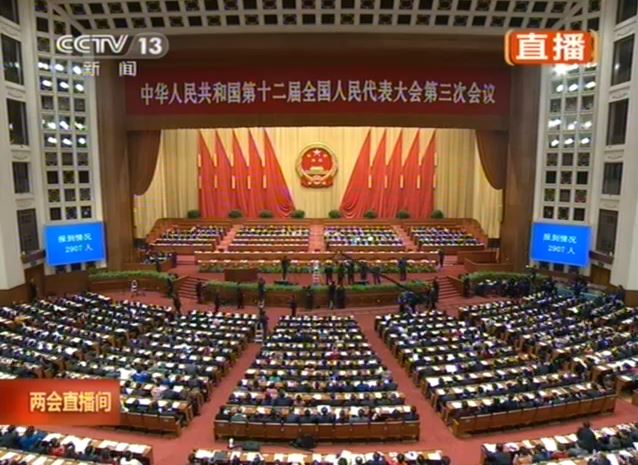A few days ago, one of the most important Chinese political events of the year occurred: the dual meetings of the National People’s Congress (NPC) and the National Committee of the Chinese People’s Political Consultative Conference (CPPCC), commonly referred to as the “Two Sessions”. The NPC is the highest legislative branch of Chinese government and is in charge of supervising the enforcement of the constitution, overseeing government operations, electing officials (including the president), and a variety of other legislative duties. The CPPCC is the official government political advisory group, composed of delegates from different political parties, organizations, and independent members. The NPC and CPPCC have convened in Beijing to for weeklong session that started on March 3rd. The Two Sessions will set the tone for Chinese politics in 2015 and in that way mirrors the State of the Union. Chinese Premier Li Keqiang’s opening speech in the session “Report on the Work of the Government” (video) reveals some insights into the Chinese government’s future innovation policy goals.
Two Sessions

Source: PTV
Internet and spending
In 2001, the Chinese government first proposed the adoption of “San Wang” (three networks) or the combination of broadband Internet, television, and phone service into a single connection. The San Wang is the Chinese version of an American telecommunication company offering a “Triple Play”. During his speech, Li Keqiang emphasized the role of the Internet in economic growth. San Wang, along with fiber-optic network construction, were identified as important actions for the government to pursue in 2015. In addition, he mentioned the need to build a strong logistic service to further promote Internet based spending.
“Internet Plus” strategy
Li Keqiang also officially introduced the “Internet Plus” action plan as essential to increasing Chinese competitiveness in emerging industries. The Internet Plus plan aims to integrate mobile networks, cloud computing, big data, the Internet of things, and other related IT technologies with modern manufacturing. The integration will promote the healthy development of e-commerce, industrial networks and Internet finance, and subsequently increase Chinese Internet companies’ presence in the global market. High-end equipment, information networks, integrated circuits, new energy, new materials, biomedicine, aero-engines and gas turbines are also identified in the speech as examples of important emerging industries that need facilitation. In conjunction with the effort to promote emerging technology, the Chinese government established a 40 billion Chinese yuan fund (approximately $6.38 billion) for emerging industries investment and the government will raise more funds in the future to promote business.
The Chinese government is gradually realizing the transformative potential of the Internet to improve economy. Both the San Wang and the Internet Plus strategies are holistic policies. The plans focus on creating synergies between the Internet and other existing industries. These strategies are likely to yield the best results for China.
Yikun Chi contributed to this post
Check out more TechTank content here



Commentary
At Chinese ‘State of the Union,’ key technology policies underline innovation goals
March 11, 2015